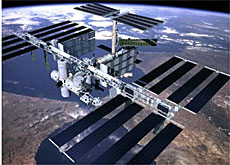Final frontier opens doors for research

Researchers and business people have been meeting in Lausanne to discuss future commercial uses of the International Space Station (ISS).
Supporters say the ISS has the potential to revolutionise many areas of research. But critics question whether it is really worth the money.
The Columbus science laboratory is Europe’s principal contribution to the ISS. The 4.5-metre cylindrical module is scheduled to launch late in 2004.
The European Space Agency says the almost complete absence of gravity will provide a unique environment for many aspects of medical research, as well as the development of high-performance industrial materials.
“Weightlessness will also enable research to be done into combustion and fluid physics which is not possible on Earth,” Marc Heppener, head of the ISS utilisation and microgravity promotion division, told swissinfo.
Global cooperation
The International Space Station is a cooperative programme between Europe, the United States, Russia, Canada and Japan. It should be completed and fully operational by 2006.
The station has cost $40 billion so far. Each shuttle flight costs another $400 million. Since the station will require about 60 flights or more over its ten to 15 years of operation, that is a total of about $25 billion. Meanwhile running costs are estimated to add up to another $40 billion.
Budget cuts mean that for the moment only three people – rather than the seven originally envisaged – will live on the station at any one time.
This has reduced the amount of time available for research, but the ESA says plenty of scientific research will still take place.
In addition, scientists on Earth will be able to conduct and control experiments directly from several User Centres or even their own workplaces.
Synchronise your watches
The Swiss watch manufacturer, Fortis, and the German car manufacturer, DaimlerChrysler, are two of the partners in the first commercial experiment on the space station.
Global Transmission Services (GTS) is a new system for transferring radio signals from the ISS that aims to overcome the limitations of existing systems.
The technology is currently being tested for two applications: the worldwide synchronisation of watches and the deactivation of stolen vehicles.
The days of changing your watch manually when you switch time zones or when the clocks change between summer and wintertime could soon be numbered.
“With GTS, everything is done automatically,” Fortis’s Markus Brantschi told swissinfo.
“At the moment this would happen six to seven times a day when the ISS is flying over your position wherever you are in the world.
“In the future, the idea is also to connect it to a satellite system where you will have a constant signal.”
Other applications could include the tracking of goods or individuals worldwide. Brantschi estimates that it will be about five years before the technology sees the light of day.
Costs
As a member of the European Space Agency (ESA), Switzerland will contribute about SFr120 million ($80 million) to the project between 1996 and 2005.
However, nearly 80 per cent of this money is ploughed back into Swiss companies, who are involved in the development of the structure.
Switzerland finances 3.64 per cent of the total ESA budget. Its contribution in 2001 amounted to SFr120 million out of a total budget of SFr3.3 billion.
swissinfo, Vincent Landon
Europe, US, Russia, Canada and Japan cooperate on the ISS.
It should be completed and fully operational by 2006.
The ISS travels at a speed of 7.7 kilometres per second.
It orbits about 390 kilometres above the Earth.

In compliance with the JTI standards
More: SWI swissinfo.ch certified by the Journalism Trust Initiative








You can find an overview of ongoing debates with our journalists here . Please join us!
If you want to start a conversation about a topic raised in this article or want to report factual errors, email us at english@swissinfo.ch.